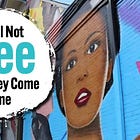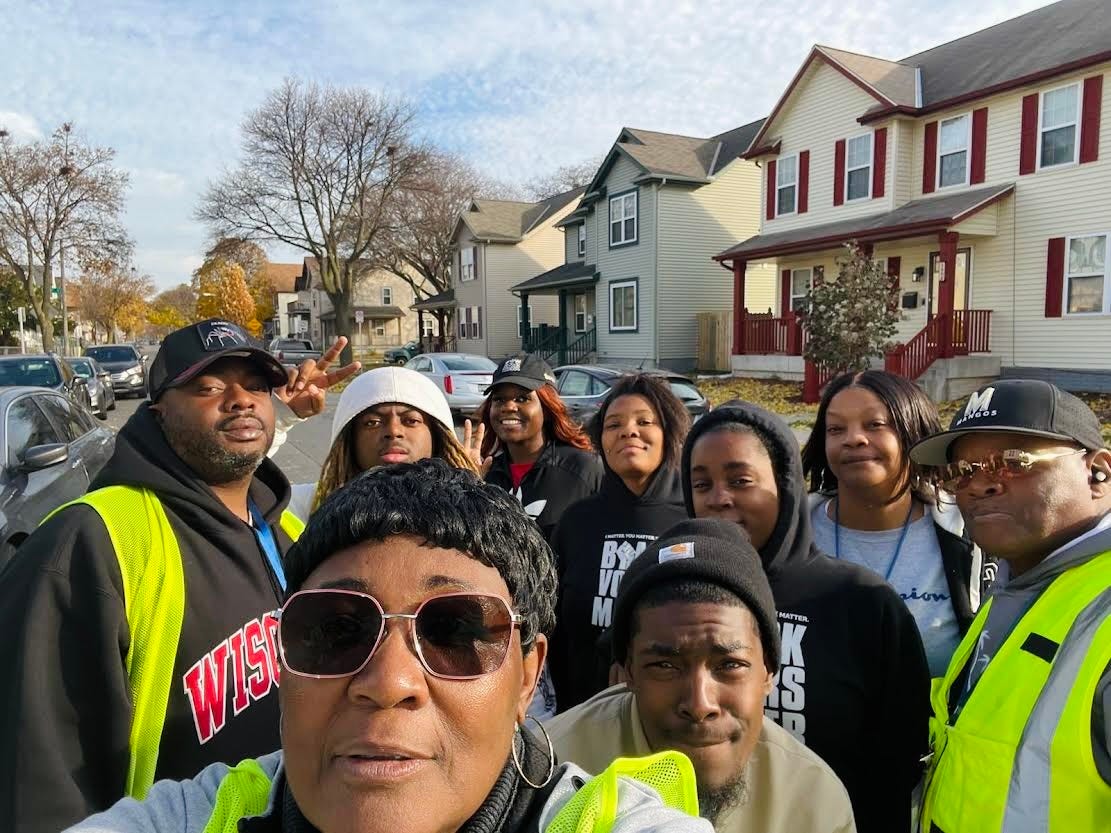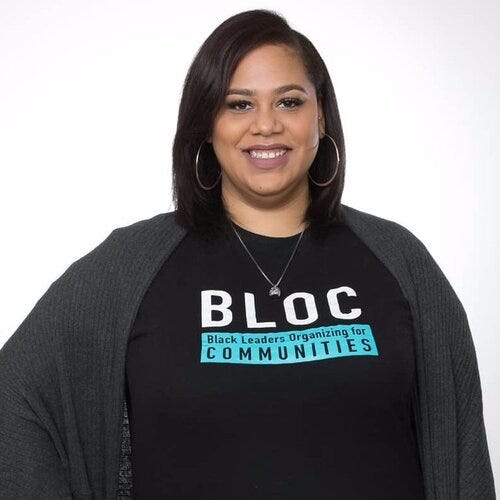Black voters in Milwaukee might not be as big on Biden right now. But we need to reframe our thinking of electoral politics in 2024.
"Times are hard, and people withholding their vote is not always from a place of apathy or lacking education...Black voters have a more sophisticated analysis than what people give us credit for."
The Recombobulation Area is a ten-time Milwaukee Press Club award-winning weekly opinion column and online publication written, edited and published by longtime Milwaukee journalist Dan Shafer. Learn more about it here.

Column by Angela Lang, executive director of Black Leaders Organizing for Communities (BLOC). Lang is a regular contributor to The Recombobulation Area.
I sat down with CNN’s John King in October to give him and his team a glimpse into how Black voters were feeling about next November’s election.
A lot of folks want to know what Black voters in a swing state like Wisconsin are saying and feeling with a little over a year away from the election. I think it is incredibly wise that we are having these conversations now and not next summer with such a small window to course correct. One of our own Ambassadors, Devonta Johnson — who was featured in the segment — didn’t commit to voting for Biden (though he would never vote for Trump). He is wondering if Biden has done enough to earn his vote.
It’s not all doom and gloom out canvassing and knocking on doors, though. There are some bright spots where folks are glad to see us engaging in between elections. Sentiments and attitudes will change as we get closer to the election and the political landscape changes. But it’s unclear which way they’ll go. People may tap in as there is more buzz, and when Milwaukee hosts the RNC, and some people may continue to feel strongly about sitting this election out.
The main feedback we heard from residents and voters was that people weren’t interested in talking about next November. It could simply be because it's early and people face more pressing issues in their daily lives. It could also be people frustrated with the current dysfunction in Congress and it feels like there’s more infighting than actual policy being passed. It could be a number of reasons.
BLOC does a bulk of our work in the 53206 ZIP code — a ZIP code infamous for its challenges. It’s a place where some electoral organizations don’t see value in knocking on doors. Time after time, door after door, we hear that people have lived in their neighborhood for years and have had little to no engagement from political organizations.
The 53206 ZIP code is among the nation’s most incarcerated. It’s seen as ground zero for so many intersecting challenges that come with mass incarceration and returning home after.
Folks who run traditional electoral field programs typically have limited time and resources, so they tend to pick and choose which voters to talk to based on certain criteria. The people who are often prioritized are those who turn out to vote more consistently. This model leaves out talking to new voters, folks who just turned 18, voters who just moved to Milwaukee, and voters who may be voting for the first time — including those who had their voting rights restored after getting out of prison.
With these factors and variables, 53206 is often not prioritized in terms of electoral turnout, nor are the issues facing that community. This is a severe misstep and a missed opportunity. While there has been a shift in recent years, there is more work to be done. When there is not year-round engagement about issues, even to provide updates on what is being worked on, people disengage.
When folks get out of prison and try to rebuild their lives, it’s often not easy. There are new challenges and barriers to try and reintegrate back into your community. My last piece for the Recombobulation Area talks about how some of these challenges create barriers to participating in civics and the democratic process. These factors directly play into how people see themselves as political change agents. When you experience trauma and challenges day in and day out without a light at the end of the tunnel, politics can feel out of reach.
When some of the issues that have been promised to you last election cycle aren’t fulfilled, you start to disengage. Some folks are only engaged around their issues, when it’s time to get our votes. We hear it all the time. When you only see your elected official when it is time to run for office, and they potentially start to take questionable votes and stances, you don’t feel like democracy or politics is working for you. A democracy is supposed to include all of us, our issues, and negotiating power in a civil way.
At times, it feels like democracy and politics is something that happens to us rather than by us.
After the CNN piece aired, some of my political friends didn’t understand what the disconnect was. I believe the White House has a messaging problem. Some of my political campaign friends don’t always understand why Biden's numbers are slipping among Black voters. From their perspective, they understand the inside baseball, what is moving though the political process. If things are stalled, they know why.
But some of that insight doesn’t always trickle down to voters. In February, the White House published a fact sheet on their website about the equity work the administration has done in the Black community. It sounds good on paper, but when you talk to Black voters, how many of these points can people name? How many of these points and policies have people felt in their daily lives? The Child Tax Credit and various infrastructure policies are the only things we hear named by Black voters. People remember Vice President Harris’ visit to Milwaukee, because she talked about getting rid of the lead pipes in our community.
Lead in our water is an everyday issue for folks and this was a tangible victory people could point to. We need more examples like this, as well as a bridge to what has already been done. Telling people what you will do if reelected isn’t always enough. People want to see a proven track record.
People are working multiple jobs to try and make ends meet. Groceries and baby formula are expensive. Housing costs continue to rise while economic anxieties linger. Everyday life has not gotten any better for folks.
That makes it hard to see the impacts of the Executive Orders or the few things passed in Congress. An Executive Order that caught folks’ attention was forgiving a portion of student loan debt. Any excitement our community had was swiftly taken away by the Supreme Court blocking its implementation. No student loan forgiveness, no affordable housing and other lack of investments in communities lead to resentment of the folks in charge.
Thirty years ago, Tupac famously rapped the lines:
They got money for wars, but can't feed the poor
Said it ain't no hope for the youth and the truth is
It ain't no hope for the future
Our CNN interview was conducted just days before violence erupted in Israel and Gaza. The last couple weeks, it has been said numerous times — in our office, and outside of it — that at any given moment, we have a blank check ready for foreign aid, but folks here are struggling. At every twist and turn our communities have been told time and time again that the programs we want to see investment in, just simply are too expensive. How will we pay for that?
Our communities feel like we are left behind and not made to be a priority. Political conversations are hard because of it.
But while sometimes these conversations can be frustrating for some, it is important that we not vilify people who are giving up on the political system. It is a privilege to be civically engaged and to even be writing this analysis. Vilifying and insulting folks who have been beaten down in every which way by life will surely not persuade them to vote.
“At times, it feels like democracy and politics is something that happens to us
rather than by us.” - Angela Lang
I see this time and time again. “Vote Blue no matter who” does not resonate with our community. It’s simply not enough these days. We have to come from a place of understanding — understanding voters’ frustration and hurt.
Civic education is also important. Before casting judgment on a community — one that is disenfranchised and not as engaged as others — better to think about what it must be like to deal with trauma on a daily basis. When you see video lynchings of people who look like you at the hands of state sanctioned violence and your own elected leaders are silent, and hear campaign promises that don’t lead to any change, you start to check out. I’ve heard so many residents say, “It’s just me and my family against the world trying to make it, I don’t pay attention to that stuff.” I tell them I understand. Some I’ve been able to move; some I haven’t.
I always ask why they feel that way. What was the moment that led them to stop participating? Someone told me once that they don’t believe Black folks are apathetic, it's just we aren’t in a position to show up the same way others do. This sentiment is one I heard more than a decade ago and it’s still one I hold close to me. I encourage others to ask the same questions.
If you read this and plan to canvas for the upcoming elections, show compassion and come from a place of understanding. It’s only the folks on the ground who can move people, not the overpaid DC consultants who haven’t stepped foot in the state.
Times are hard, and people withholding their vote is not always from a place of apathy or lacking education, it is often a more astute political analysis than people expect. Black voters have a more sophisticated analysis than what people give us credit for.
Sometimes people attribute a lack of enthusiasm or lack of turnout to simply not having a Black candidate on the ballot. Not only is this offensive, but it's extremely reductive of the root issues at hand. The blame is always placed on the voter versus the candidate or the campaign not speaking honestly with voters. It's easier to blame the voter than the campaign, but it doesn’t allow us to understand the “why.”
Votes need to be earned, not just assumed. By putting the sole burden on the voter, it doesn’t push the candidate or the campaign to actually address the needs of the voters. It creates a cycle where people don’t feel their issues are being addressed, they stop showing up, and then we blame the voter. This cycle can be broken only if we reframe our thinking of electoral politics.
Angela Lang is the executive director of Black Leaders Organizing for Communities (BLOC). She was born and raised in the heart of Milwaukee. She has an extensive background in community organizing. In the past, Angela served as both an organizer and State Council Director for the Service Employees International Union, working on such campaigns as the Fight for 15. Before joining BLOC, Angela was the Political Director with For Our Future Wisconsin. She is a graduate of Emerge Wisconsin and has had the pleasure of being the featured trainer for Emerge's Diversity Weekend since 2015.
Subscribe to The Recombobulation newsletter here and follow us on Facebook and Instagram at @therecombobulationarea.
Already subscribe? Get a gift subscription for a friend!






This is a really thoughtful, perceptive, and powerful piece by BLOC's Angela Lang. Thanks for publishing it.
I have seen this argument online a hundred times over, and every time I have the same response.
There are 330 million Americans. There is one president, chosen from only two realistic options. There is not a single person anywhere in the country who is getting everything they want.
Your choice is between one who will actively work to move you forward, even if those efforts don't always bear immediate fruit, versus one who will actively work to take away what you have now.
You are choosing the less worse of two options, the one who will not make you go backwards. Every person who doesn't vote to move forwards is voting to move backwards.
I'm sorry if that doesn't sound like a reason to get out of bed in the morning, but that's all any of us are doing. You don't get the magic option of someone who will make your wishes come true. We're not voting for a king. All anyone can do is the best they can do given the limits imposed by political realities, Congress, state and local governments, and the court systems.